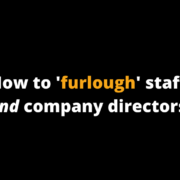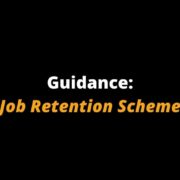How to implement the ‘80% of salary’ ‘Job Retention Scheme’
In these challenging times and with many businesses looking for answers to questions about the Government backed support, the following information, which relates to payroll & staff costs, may be useful to you:
Support for Businesses through the Coronavirus Job Retention Scheme
- The scheme will enable businesses to recover 80% of wage costs for employees on ‘furlough leave’ – which is an entirely new concept and is a new class of indefinite leave where the government will reimburse the employer for wage costs.
- This has been introduced as an alternative for employers who might have otherwise implemented redundancies, lay-offs, unpaid leave or other measures for their employees.
- All UK businesses are eligible to claim under the scheme. It seems that employees will be covered, but not other workers (such as casual staff or contractors) or the self-employed, although we expect support for these classes of worker to be announced shortly.
- The government has announced that the scheme is available for at least three months from 1 March 2020 and will be extended if necessary.
What costs can employers recover?
- The coronavirus job retention scheme allows for 80% of wage costs to be recovered up to £2,500 per month per employee. There is no limit on the number of employees or the duration. Wage costs are expected to include wages, pension contributions and employer national insurance (NI) contributions, although this has not yet been confirmed.
What do employers need to do?
- Employers and employees will need to agree the members of staff being designated as ‘furloughed workers’. This should be straightforward because this route will no doubt be more attractive to employees than redundancy, lay off, unpaid leave or a reduction in pay.
- We recommend employers send a letter/email to each employee concerned and get them to agree to the change in status formally in writing.
- Employers will then need to submit details to Her Majesty’s Revenue and Customs (HMRC) through a new online portal, which is being set up urgently.
- The portal is expected to be in place by the end of April, so the 1st claim will cover the months of March & April 2020.
- The timescale for payments to businesses is not yet known.
Does the employer have to top up the employee’s pay to 100%?
- No, they do not. Some employers may wish to make up the shortfall, while others may not be able to. This just needs to be made clear to all employees concerned.
What about employees that have already been dismissed or taken unpaid leave?
- The scheme is backdated to 1 March 2020 and employers are urged by the government to take back anyone they had already dismissed and convert them to this leave instead. Likewise, with anyone who is on unpaid leave.
What situations will this not help with?
- Furlough leave is recommended for anyone that would have otherwise been laid off or made redundant due to the impact of coronavirus on the employer’s business.
- It does not help with any situations where employees had agreed to reduce their hours, or to a pay cut but where they are still required to work. There is currently no option to do a mixture of reduced hours and furlough leave.
Support for Businesses who are paying sick pay to employees
All small and medium-sized businesses and employers will be able to reclaim Statutory Sick pay (SSP) paid for sickness absence due to COVID-19.
The eligibility criteria is as follows:
- The refund will cover up to 2 weeks’ SSP per eligible employee who has been off work because of COVID-19
- Employers with fewer than 250 employees will be eligible – the size of an employer will be determined by the number of people they employed as of 28 February 2020
- Employers will be able to reclaim expenditure for any employee who has claimed SSP (according to the new eligibility criteria) as a result of COVID-19
- Employers should maintain records of staff absences and payments of SSP (if we look after your payroll this matter is already being dealt with for you), but employees will not need to provide a GP fit note. If evidence is required by an employer, those with symptoms of coronavirus can get an isolation note from NHS 111 online and those who live with someone that has symptoms can get a note from the NHS website
- Eligible period for the scheme will commence the day after the regulations on the extension of SSP to those staying at home comes into force
- The government will work with employers over the coming months to set up the repayment mechanism for employers as soon as possible






